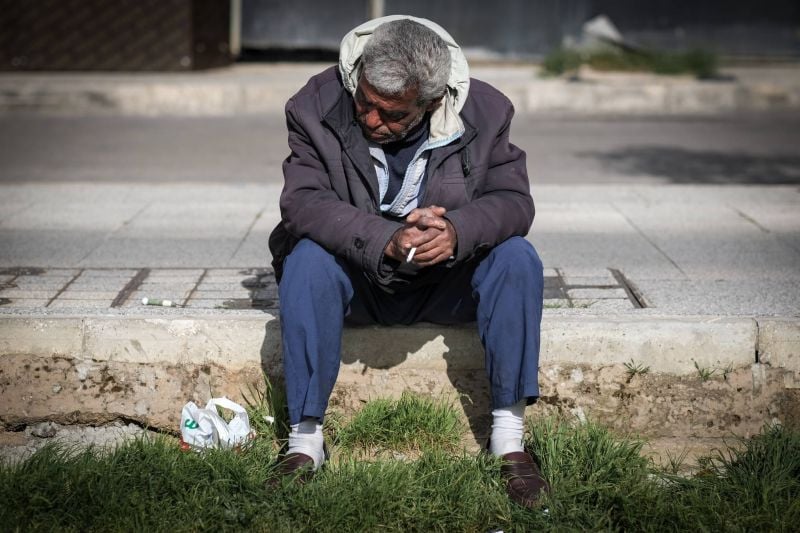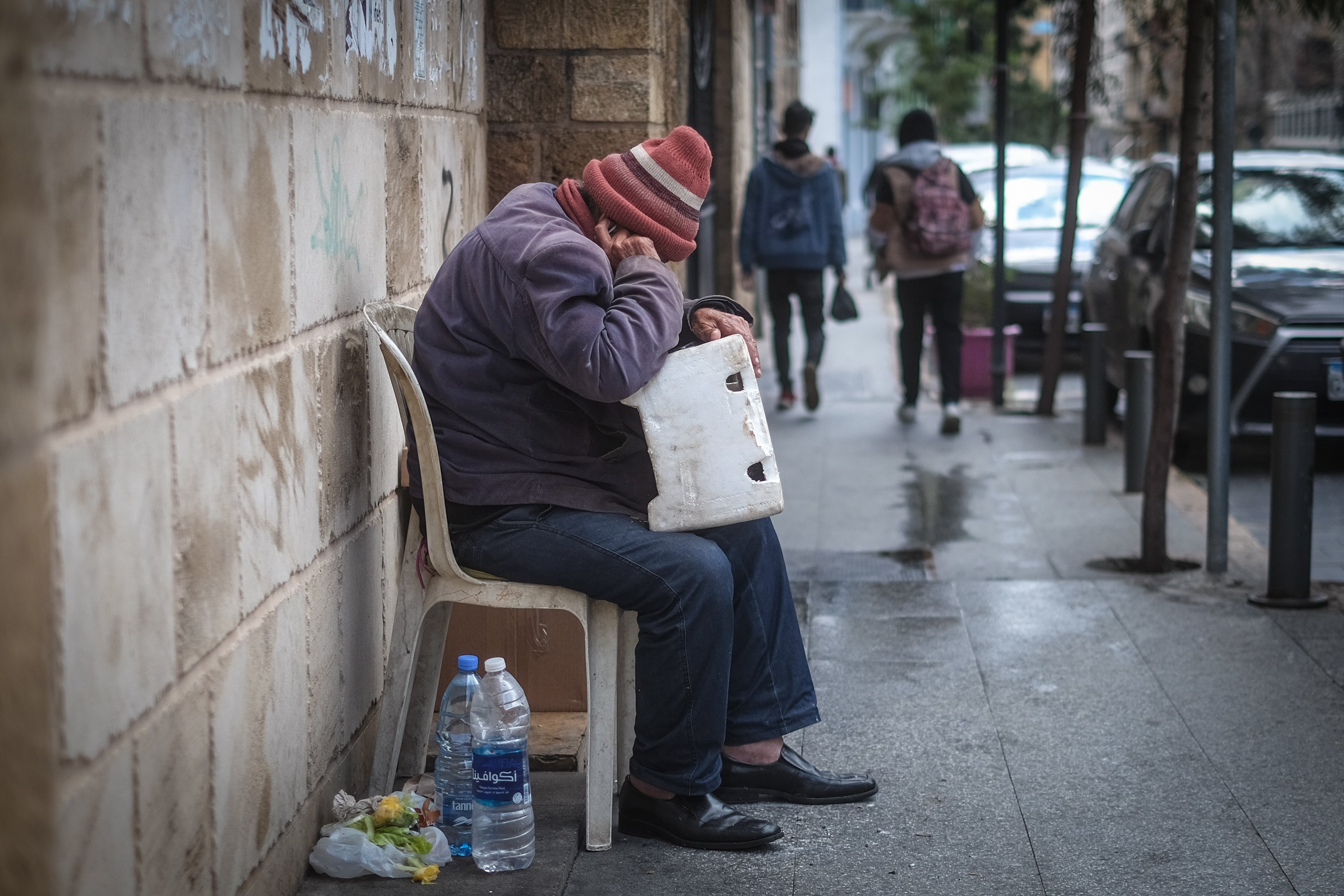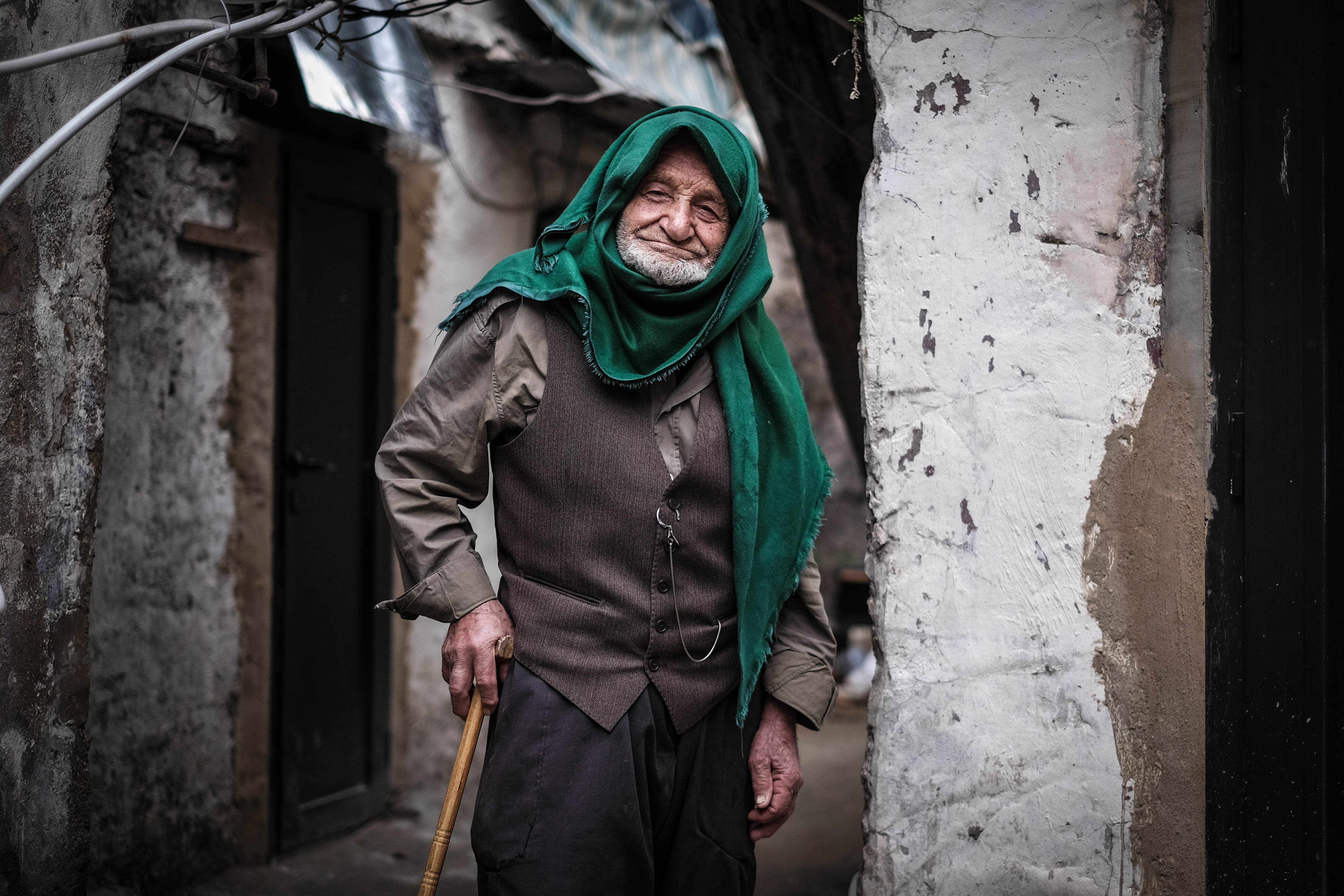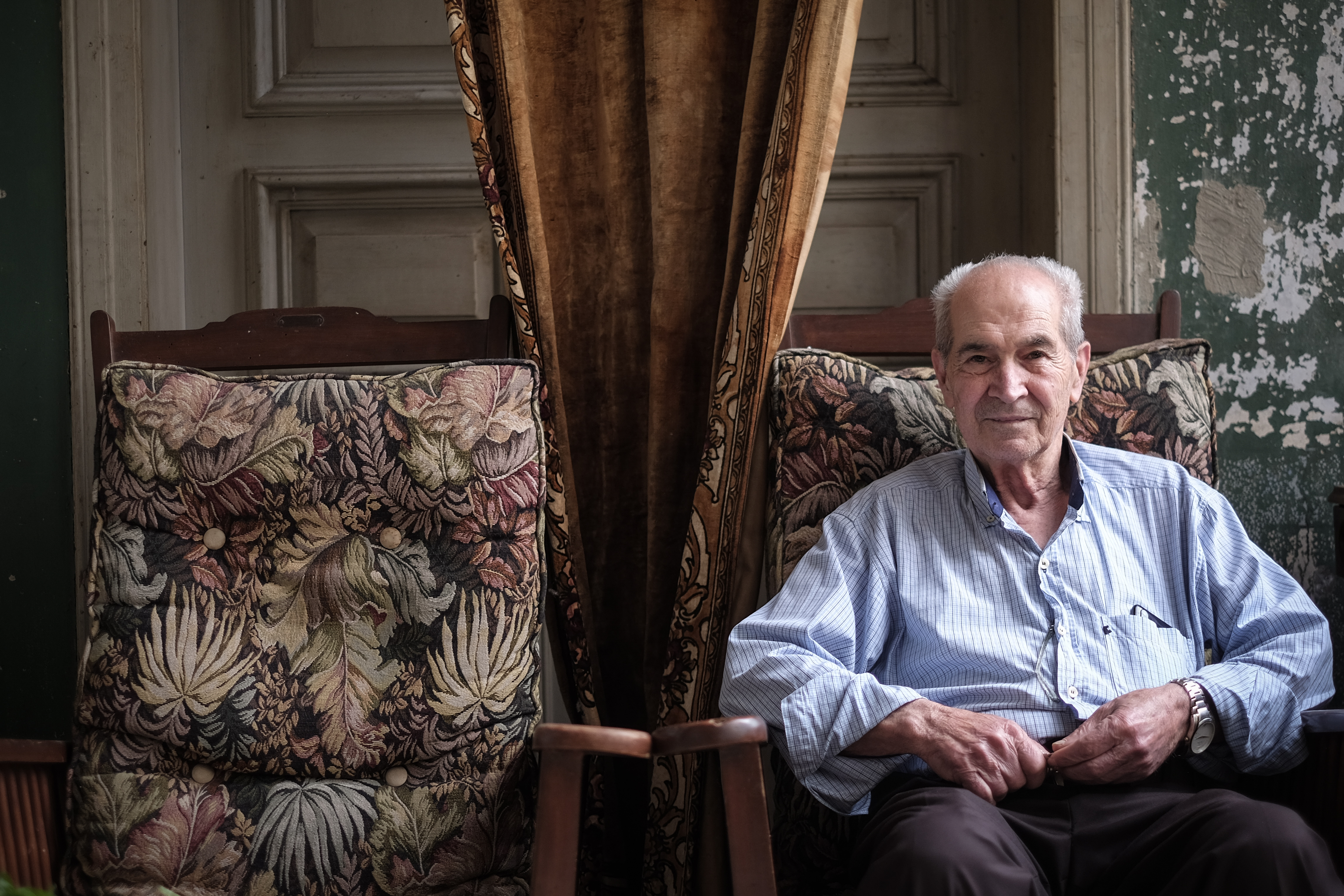
A man sits on the edge of a pavement near Martyr's Square, Beirut, March 28, 2020. (Credit: João Sousa/L'Orient Today)
BEIRUT — Since retiring from her job as a bank manager three years ago, N. spends her days, sometimes her nights, babysitting or providing at-home eldercare to boost her monthly pension of about $160 — to which she doesn’t have full access.
After occupying a prestigious position at a bank, N., who asked not to be identified, had a bright outlook for her autumn years.
“I always expected that once I retire, I’d be done with work for good. I would get to rest, even live comfortably,” she says. “I expected a fair pension.”
Many Lebanese retirees are grappling with such brutal circumstances. The country’s unremitting economic and humanitarian crisis, once touted by some as the Switzerland of the Middle East, has made it difficult to scrape by, let alone to access the necessary healthcare and support.
Since 2019, Lebanon has endured a staggering triple-digit inflation rate, causing the national currency to lose an estimated 90 percent of its value.
While nearly all merchants have explicit or implicit permission to price their goods in US dollars, many in Lebanon have no access to dollars.
Lebanon’s crisis is having its most severe impact on those who still receive their incomes, or pensions, in lira. Retirees like N. are among the most vulnerable in the country.
 An elderly man sits on a chair on a sidewalk as pedestrians pass by in Gemmayzeh, Beirut, April 14, 2023. (Credit: João Sousa/L'Orient Today)
An elderly man sits on a chair on a sidewalk as pedestrians pass by in Gemmayzeh, Beirut, April 14, 2023. (Credit: João Sousa/L'Orient Today)
‘Our pension was just ink on paper’
As the frustration grew among depositors whose savings have been illegally trapped in banks N. noticed in 2020 that her branch of Bank Audi was visibly reducing its workforce so, four years before her mandatory retirement age, she decided to retire.
With younger colleagues losing their jobs, she reasoned that she, and her colleagues, would be better off drawing on her iron-clad, and generous, pension.
She says the bank either fired employees without prior notice or “enticed us to voluntarily quit by offering us fair compensation,” N. explained. “They also tempted us with the option of settling our personal loans at the bank, which is an option I went with, along with a monthly pension.”
Little did N. know, the value of her $1000-per-month pension, paid at the official lira-dollar exchange rate (currently LL15,000-$1), would evaporate during the ensuing years of relentless economic crisis.
“I don’t even have access to the full monthly pension allotment,” she laments. “I am allowed only LL5 million in cash (around $53 at the parallel market rate) every month and the rest — LL10 million (around $106 at the parallel market rate) — gets deposited in my bank card.”
“No one accepts card payments in Lebanon today. How and where can I use the card? Very rarely do supermarkets accept card payments. Occasionally they allow me to pay for half of my groceries with the card.”
“Our pension was just ink on paper,” she says. “I can’t live off of it today.”
To secure her daughter’s university fees, N. had to sell the piece of land she had set aside for her retirement.
She was also compelled to get another job.
“They pay in ‘fresh’ US dollars.”
 Hassan, nearly 100 years old, stands in an alleyway next to his home in Beirut, Dec. 9 2020. (Credit: João Sousa/L'Orient Today)
Hassan, nearly 100 years old, stands in an alleyway next to his home in Beirut, Dec. 9 2020. (Credit: João Sousa/L'Orient Today)
‘How are we going to keep living like this?’
Fahed Shooman, a retiree since 2012, worked for over 30 years as a general security officer in Beirut, raising three children and tending to his family’s needs. Now he and his wife rely on charity for food, medicines and electricity supply.
Shooman says his pension used to be enough. Not anymore.
On top of the allotted monthly pension, Parliament granted public sector retirees a bonus amounting to twice their base pay, legislated in the 2022 budget law, then, under a new decree issued on April 18, cabinet granted them three times their pay.
With Shooman’s base monthly pension standing at LL2.3 million ($1533 before the crisis, $24 at today’s parallel market rate), he now receives LL13.8 million ($160 at Banque du Liban’s Sayrafa exchange rate, which is below the parallel market rate, to which public sector employees, including security officers, have access).
He uses one-third of his monthly pension to settle a single bill.
“How could $160 be enough if a [20 liters ] tank of fuel is above a million [lira] and a cylinder of propane is close to a million [lira], while the [private generator] subscription bill comes to $55 for only 2.5 amperes?” he said.
“We haven’t even worked out potential expenses if someone falls sick or if we need to fix the car.” Shooman continued. “How are we going to keep living like this?”
Shooman said that family members, including his children, who themselves “barely get by,” help out with money every now and then.
“I get $20 from here, $30 from there. Someone brings a food parcel from time to time, but that’s about it.”
 Omar, 83, who retired in 2006, sits on his armchair, Beirut, May 19, 2023. He depends on his two sons’ remittances for a living. (Credit: João Sousa/L'Orient Today)
Omar, 83, who retired in 2006, sits on his armchair, Beirut, May 19, 2023. He depends on his two sons’ remittances for a living. (Credit: João Sousa/L'Orient Today)
Lebanon’s economy relies heavily on imports, which are usually priced in dollars, making it extremely difficult for most people to afford everyday products.
“Believe me, we are deprived of many things that we used to have — such as chicken, meat, filling up the car’s gas tank and going out during the weekends. We don’t buy or do these things anymore,” Shooman said.
“We only leave the house out of extreme necessity — to buy groceries or visit family.”
While Shooman can barely scratch out a living from his devalued pension, he says he was fortunate enough to have retired in 2012, well before the economic meltdown, and received a lump-sum payment when the lira-dollar exchange rate was still stable at LL1,500 to the dollar.
“I bought my house using my [end-of-service] compensation, but imagine if I hadn’t. Imagine if I used the money for something else or deposited it in the bank,” Shooman said. “Imagine if I had to pay rent now to live in my house. How could I pay rent from my current pension if the rent, let’s say, is $300 and my entire [monthly] pension is $160?”
Unlike his father, Shooman’s son, a general security officer making a meager LL1.6 million per month (without bonuses), took a hit when it comes to his savings.
“My poor son was banking his salary to eventually buy a house, but his entire savings — $40,000 — are now gone and I cannot help him.
“Poor young man. He was waiting to get married and now, he’s 32 years old and his marriage [arrangements] have been halted,” Shooman says. “He tells me he cannot do anything. He just waits.”
Shooman’s wife was diagnosed with eye cancer this year, which required an operation at the American University Hospital — the only Lebanese hospital where doctors can perform such a meticulous surgery, he said. While Shooman’s pension scheme no longer covers his and his wife’s medical care due to the crisis, he says they sent a letter to the general security’s general director, who agreed that the directorate would cover the cost of surgery.
Shooman also suffers from heart disease and said the directorate covers his monthly medication costs.
Hundreds of former army and security officers have protested multiple times across the country over the last year, demanding increased pensions. Scuffles have broken out between ISF veterans and security forces while protesters have sometimes tried to break into Parliament and BDL’s premises, to be greeted by volleys of tear gas.
‘We former teachers are forgotten’
For Tharwat Tannir, a former private school teacher in Beirut, things are even more miserable.
“I don't have anyone. I'm not married and I am without children,” Tannir said. “I started working at the age of 20, dedicated my entire life to teaching to end up living in humiliation at 61?
She taught English and Arabic for 35 years at al-Makassed private school, before retiring at the age of 55 in 2017. Legislation allows teachers to retire once they have served 30 years in the sector.
Private sector employees are normally granted an end-of-service indemnity only, but as part of the private schools Compensation Fund scheme, Tannir was given the option to either choose an end-of-service indemnity or a monthly pension. She chose the latter.
Her monthly pension stands at LL2.8 million a month, previously equivalent to around $1,866, now slashed to less than $30 at the parallel market rate.
“How can someone who used to live off around $2,000 now make it with merely $30?” she grieved.
Unlike public school teachers, private school teachers’ salaries and pensions were never adjusted as the Lebanese lira continues to rapidly depreciate.
“Neither the government is approving a salary increase, nor are the private funds we fall under,” she says. “We former teachers are forgotten.”
Though private sector pensioners usually lose their benefits, including healthcare coverage, upon retirement — when they need them the most — Tannir said that she contributed to a teachers’ mutual aid fund that used to cover some of her medical expenses.
“But now they are asking for a fee paid in US dollars, equivalent to almost $100 a month,” she said. “How can I pay $100 for the fund if I’m getting paid $30?”
Electricity, “a distinct human right,” is another basic utility Tannir cannot afford.
Due to the limited service provided by the state electricity utility, residents and businesses throughout the country have been depending on private generator services for decades.
Tannir’s brother, who lives in the same neighborhood, has run an extension cord to her apartment to share some of his own power.
‘I live from begging’
Jamal Telawi worked as a carpenter at the Mohammad Khaled Social Foundation for 42 years.
He drew on his pension after 26 years, as Lebanon’s labor code allows, finally retiring in 2021 after a further 16 years of service, he was left with LL21 million in end-of-service indemnity payments.
While this sum had been worth some $14,000 at the former official rate, in 2021, when he withdrew it in December 2022, it came to around $500 at the parallel market rate (more than LL42,000 to the dollar), a loss of about 96 percent of its worth.
Telawi waited over a year before withdrawing his lump-sum payment, as an employee at the National Social Security Fund — Lebanon’s largest employment-based provider of social services — “advised” him to delay and wait for a potential payment adjustment.
He says the NSSF employee told him to wait on a governmental decision that might grant retirees their pension in dollars or at a better lira exchange rate.
No such government decision was announced. Telawi ended up withdrawing his compensation at an even lower value.
“They deceived me,” he said.
With only $500, which he has already spent, no job, no source of hard currency, Telawi “survive[s] on aid nowadays.”
“I have nothing, no one. I live from begging,” he said. “Nothing is more humiliating.”
He depends heavily on charitable aid organizations for food, rent and medical expenses.
“My daughter sometimes helps me too,” he said, “but she can barely get by herself with how salaries are worth nothing right now in Lebanon.”